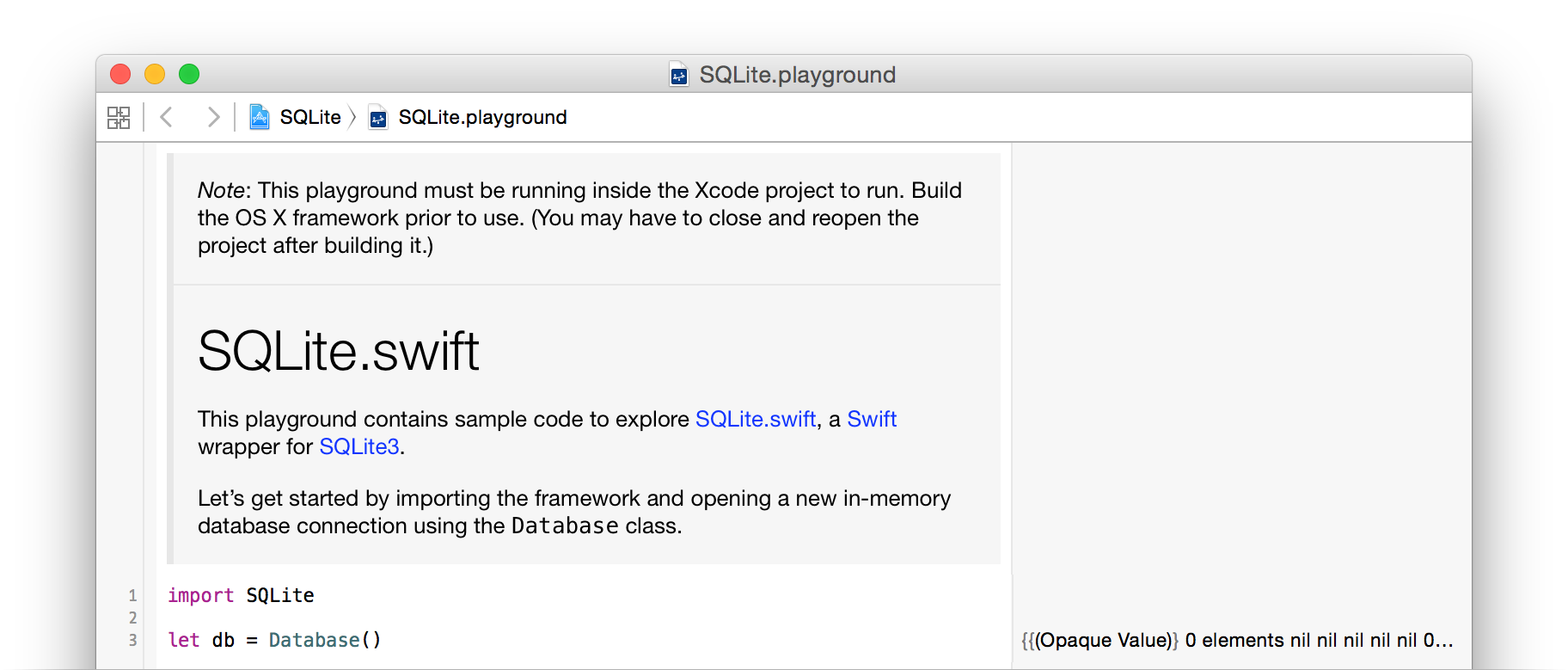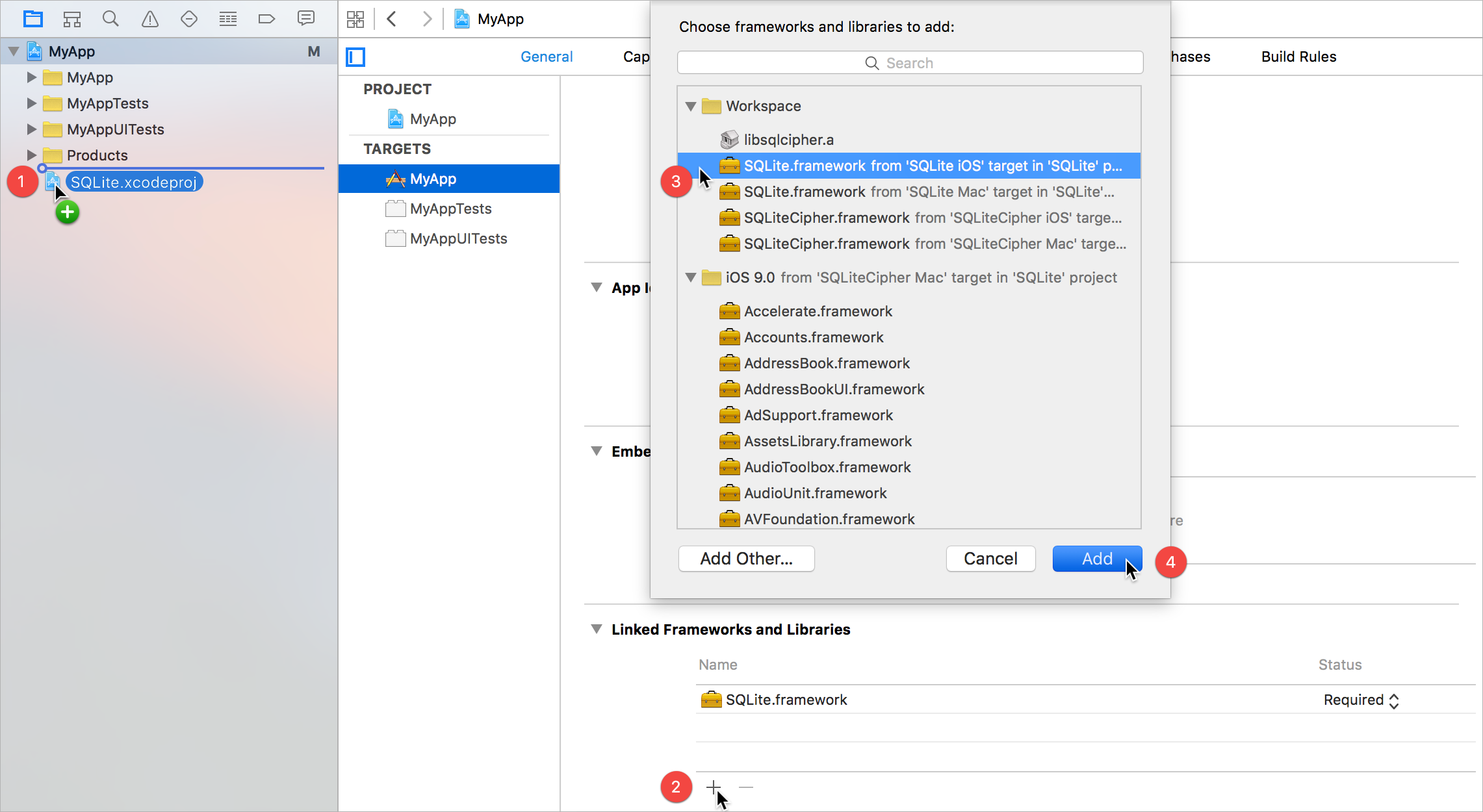A type-safe, Swift-language layer over SQLite3.
SQLite.swift provides compile-time confidence in SQL statement syntax and intent.
- A pure-Swift interface
- A type-safe, optional-aware SQL expression builder
- A flexible, chainable, lazy-executing query layer
- Automatically-typed data access
- A lightweight, uncomplicated query and parameter binding interface
- Developer-friendly error handling and debugging
- Full-text search support
- SQLCipher support
- Well-documented
- Extensively tested
import SQLite
let db = try Connection("path/to/db.sqlite3")
let users = Table("users")
let id = Expression<Int64>("id")
let name = Expression<String?>("name")
let email = Expression<String>("email")
try db.run(users.create { t in
t.column(id, primaryKey: true)
t.column(name)
t.column(email, unique: true)
})
// CREATE TABLE "users" (
// "id" INTEGER PRIMARY KEY NOT NULL,
// "name" TEXT,
// "email" TEXT NOT NULL UNIQUE
// )
let insert = users.insert(name <- "Alice", email <- "alice@mac.com")
let rowid = try db.run(insert)
// INSERT INTO "users" ("name", "email") VALUES ('Alice', 'alice@mac.com')
for user in db.prepare(users) {
println("id: \(user[id]), name: \(user[name]), email: \(user[email])")
// id: 1, name: Optional("Alice"), email: alice@mac.com
}
// SELECT * FROM "users"
let alice = users.filter(id == rowid)
try db.run(alice.update(email <- email.replace("mac.com", "me.com")))
// UPDATE "users" SET "email" = replace("email", 'mac.com', 'me.com')
// WHERE ("id" = 1)
try db.run(alice.delete())
// DELETE FROM "users" WHERE ("id" = 1)
db.scalar(users.count) // 0
// SELECT count(*) FROM "users"SQLite.swift also works as a lightweight, Swift-friendly wrapper over the C API.
let stmt = db.prepare("INSERT INTO users (email) VALUES (?)")
for email in ["betty@icloud.com", "cathy@icloud.com"] {
stmt.run(email)
}
db.totalChanges // 3
db.changes // 1
db.lastInsertRowid // 3
for row in db.prepare("SELECT id, email FROM users") {
println("id: \(row[0]), email: \(row[1])")
// id: Optional(2), email: Optional("betty@icloud.com")
// id: Optional(3), email: Optional("cathy@icloud.com")
}
db.scalar("SELECT count(*) FROM users") // 2Read the documentation or explore more, interactively, from the Xcode project’s playground.
Note: SQLite.swift requires Swift 2 (and Xcode 7) or greater.
The following instructions apply to targets that support embedded Swift frameworks. To use SQLite.swift in iOS 7 or an OS X command line tool, please read the Frameworkless Targets section of the documentation.
Carthage is a simple, decentralized dependency manager for Cocoa. To install SQLite.swift with Carthage:
-
Make sure Carthage is installed.
-
Update your Cartfile to include the following:
github "stephencelis/SQLite.swift" "master" -
Run
carthage updateand add the appropriate framework.
CocoaPods is a dependency manager for Cocoa projects. To install SQLite.swift with CocoaPods:
-
Make sure CocoaPods is installed. (SQLite.swift requires version 0.37 or greater.)
-
Update your Podfile to include the following:
use_frameworks! pod 'SQLite.swift', git: 'https://github.com/stephencelis/SQLite.swift.git' # instead, for SQLCipher support pod 'SQLiteCipher.swift', git: 'https://github.com/stephencelis/SQLite.swift.git'
-
Run
pod install.
To install SQLite.swift as an Xcode sub-project:
-
Drag the SQLite.xcodeproj file into your own project. (Submodule, clone, or download the project first.)
-
In your target’s General tab, click the + button under Linked Frameworks and Libraries.
-
Select the appropriate SQLite.framework for your platform.
-
Add.
Note: To install with CocoaPods, see above.
To install SQLite.swift with SQLCipher support:
-
Make sure the sqlcipher working copy is checked out in Xcode. If sqlcipher.xcodeproj is unavailable (i.e., it appears red), go to the Source Control menu and select Check Out sqlcipher… from the sqlcipher menu item.
-
Follow the instructions above with the SQLiteCipher target, instead.
Note: By default, SQLCipher compiles without support for full-text search. If you intend to use FTS4, make sure you add the following to Other C Flags in the Build Settings of the sqlcipher target (in the sqlcipher.xcodeproj project):
-DSQLITE_ENABLE_FTS4-DSQLITE_ENABLE_FTS3_PARENTHESIS
Read the contributing guidelines. The TL;DR (but please; R):
- Need help or have a general question? Ask on Stack
Overflow (tag
sqlite.swift). - Found a bug or have a feature request? Open an issue.
- Want to contribute? Submit a pull request.
SQLite.swift is available under the MIT license. See the LICENSE file for more information.
Looking for something else? Try another Swift wrapper (or FMDB):


